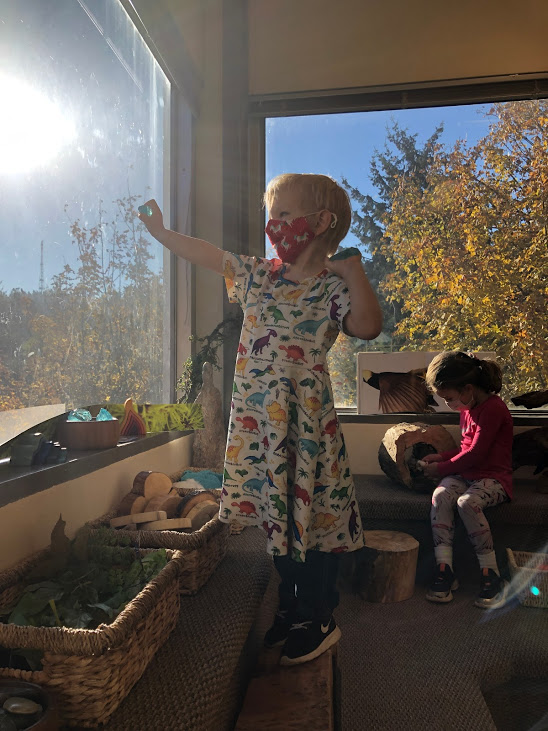Staying Close

Through Opal School’s courses, I’ve been in conversations with teachers whose learning communities are impacted by the Covid 19 pandemic in the full range of manners: Some, like Opal’s Beginning School, are meeting in person, navigating the challenges of temperature checks and sterilization; others, like Opal’s elementary school, are striving for playful connection in online gatherings; still more are combining the two or dancing between one and the other as conditions shift. Here in Portland, we are deeply in the midst of the crisis, experiencing shutdowns and holidays without family gatherings – but I correspond with colleagues in Australia, who write of how life has returned to (almost) normal as their public health responses have led to a close to total eradication of the virus.
Regardless of that range of public health dictates around social distancing, we all strive to create learning communities of connection and proximity – because that’s where humans thrive.
In the spring, early in the crisis, I was touched by the words of Bill McKibben:
What’s the thing that most people miss above all? It’s just the chance to be gregarious, to be with other people. Human beings are socially evolved primates. It wasn’t that many generations ago that we were sitting on the floor of the Savannah picking lice out of each other’s fur. So, it’s hard to be told not to go touch people, hug people, be near people, talk to people, shake hands – all the things that we’re used to. When we get out of detention, I hope it will be a reminder to us how much social distancing we’ve been doing already these last few decades, how much we’ve retreated into a world of screens. I think that we might – just might – prize each other a little bit more – and that if we do, we can begin to see how, in that pleasure, we might begin to replace some of the consumption that… drives every environmental challenge that we face. Who knows? It’s also possible that we’ll just set up all the pins in the bowling alley again.
Now, as vaccines promise a not-so-distant shift into something new, I listen to Agustín Fuentes:
When you talk about humans, our niche is social, through and through. Humans are never really alone. Even when we’re by ourselves spatially, like sitting in a room, our thoughts are filled with others; our bodies are even potentially carrying the skin cells of others and a variety of other things. So we are always thinking with and about other people, even when we’re not with them. In fact, our resting neurobiological state, like when you’re at complete rest, the default state of the brain is social. It’s the same one that turns on for social interactions.
So that means that over evolutionary time, the bodies, the structures of being human have adapted to and integrated themselves into the system where the social is everything. The psychologist Michael Tomasello says this great phrase: “a fish is born expecting water; a human is born expecting culture.” And so if we step out and think of the culture, the social, all of that dynamics as the water we live and breathe and move in, and how it shapes us and we shape it, then that statement makes sense.
McKibben and Fuentes point to how a social-constructivist approach of playful inquiry is not just a fun and beautiful way of approaching learning: it’s also rooted in what we know about our species. As Devin (age 10) told us, it’s all about the brine we are soaking in:
We are like a cucumber and when we are soaked in something like the goals and expectations we are a pickle so we are always used to connecting and doing things around the Opal goals and expectations, so when you are a pickle you cannot change back into a cucumber.
That effort to identify, develop, and maintain Devin’s brine, Fuentes’ niche and Tomasello’s water, McKibben’s reach for continuity back to the Savannah, was always a stretch for schools – and it has been truly strained this year. Our ability to connect across distances has been tested and the long-term damage remains to be seen.
Fuentes, again from the same interview:
One of my great fears is that people are not paying enough attention to the psychophysiological, or more specifically put, the neuroendocrinological, the hormone physiology and brain impacts of what we’re doing now. This lack of connections, these distancings, even though they’re so important for overall health and for societal and economic health, we need to be aware that we have to find some way to keep social, because our bodies and our minds are being damaged by not being around other people, not touching other people.
Many of you reading this are heading into a holiday break. A time typically hallmarked by closeness will be strained. May paying attention to that feeling – to that diminishment –inform our hopes and commitments to our work with children and each other going forward. For those of you who are game, I think that Susan’s new Beautiful Learning course would be a great place to grow these ideas.
Wishing all of you a new year of growth, joy, and meaning.
